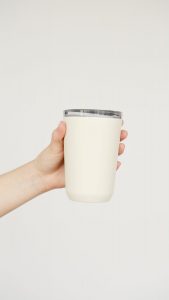 We focus a lot on eating a healthy pre and post workout snack that contains protein and carbs. One of those options is yogurt and fruit and another is cheese and crackers. Many of the protein options come from dairy products, but is dairy in your diet really a healthy option or not. If you're lactose intolerant, milk products probably aren't the best thing to eat, even though most report that small amounts of cheese, cottage cheese or yogurt doesn't affect them. What about the rest of the people who aren't allergic or intolerant of dairy?
We focus a lot on eating a healthy pre and post workout snack that contains protein and carbs. One of those options is yogurt and fruit and another is cheese and crackers. Many of the protein options come from dairy products, but is dairy in your diet really a healthy option or not. If you're lactose intolerant, milk products probably aren't the best thing to eat, even though most report that small amounts of cheese, cottage cheese or yogurt doesn't affect them. What about the rest of the people who aren't allergic or intolerant of dairy?
Some dairy options are healthier than other dairy options.
Even within the same type of dairy products, such as a glass of milk or a pat of butter, you'll find differences. Choosing milk or dairy products made from milk that came from grass-fed cows is healthier. It's higher in omega-3 fatty acids and linoleic acid. Fermented dairy, like kefir, yogurt, cheese and cottage cheese are also more easily digested and particularly low in lactic acid, compared to a whole milk option.
There are 22 essential nutrients in milk.
On the plus side, milk has calcium, magnesium, phosphorus, zinc and potassium. It also is high in protein and contains vitamins A, B6, B12, E and K plus folate, thiamin, niacin, iron, riboflavin and selenium. It can provide adequate protein and improve blood sugar levels. There's still controversy over whether it's good for bones and teeth. The Nurses Health Study that followed thousands of nurses over a period of years found those that drank milk actually increased their risk of a fracture. Other studies show that countries that consumed the least amount of milk also had a lower incidence of osteoporosis.
Don't go for a low fat milk option over full fat.
People often automatically choose a low fat or no fat option, thinking it's healthier, but it's not. Manufacturers often add sugar to make it more palatable, since fat gives milk and milk products flavor. The fat keeps you feeling full longer so you'll eat less. While the Nurses study showed that milk didn't help protect bones from osteoporosis, other studies showed it did when consumed while growing. In older adults, it also helped reduce the plaque on teeth.
- If you're lactose intolerant, you'll experience bouts of gas, diarrhea and cramping after you eat or drink milk or milk products. Milk can also cause other reactions, such as increased and thicker mucus or skin rash.
- Drinking skim or low fat milk may trigger other reactions, like eczema or a skin condition similar to acne. It still occurred in full fat milk, but far less frequently.
- Yogurt and kefir provide other benefits beyond what milk provide and don't have the negatives that occur with milk. However, always choose ones that have no additives like sugar and preservatives.
- Even though milk is a good source of calcium, it may not be bioavailable or have a net gain of calcium. Some proteins in milk may actually cause calcium to leach from the bones.
For more information, contact us today at Habitat Health & Fitness

